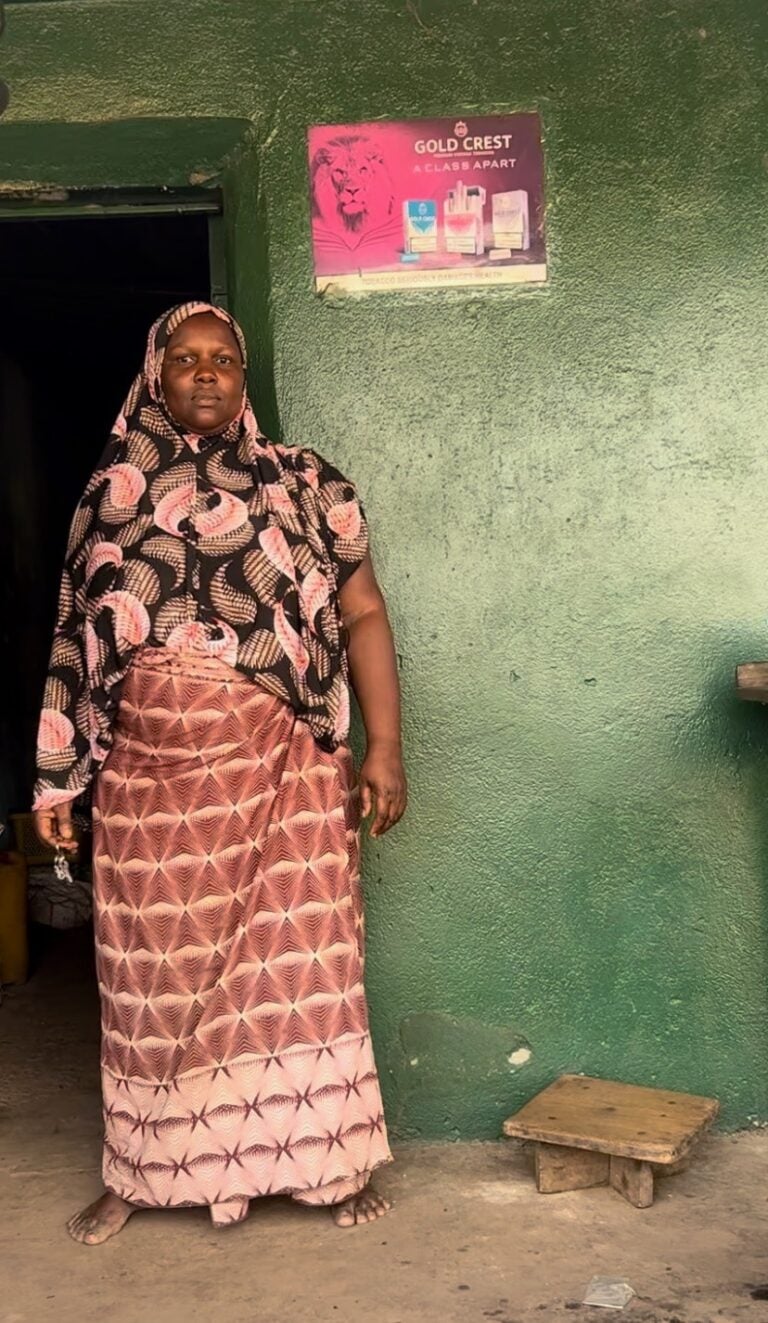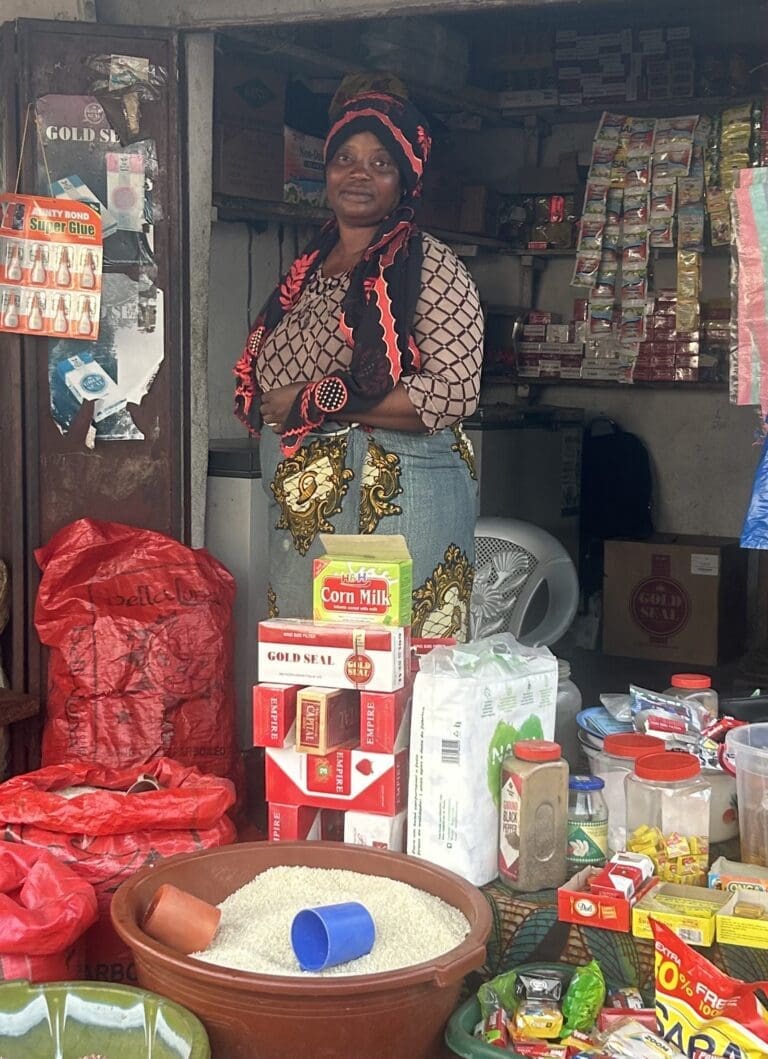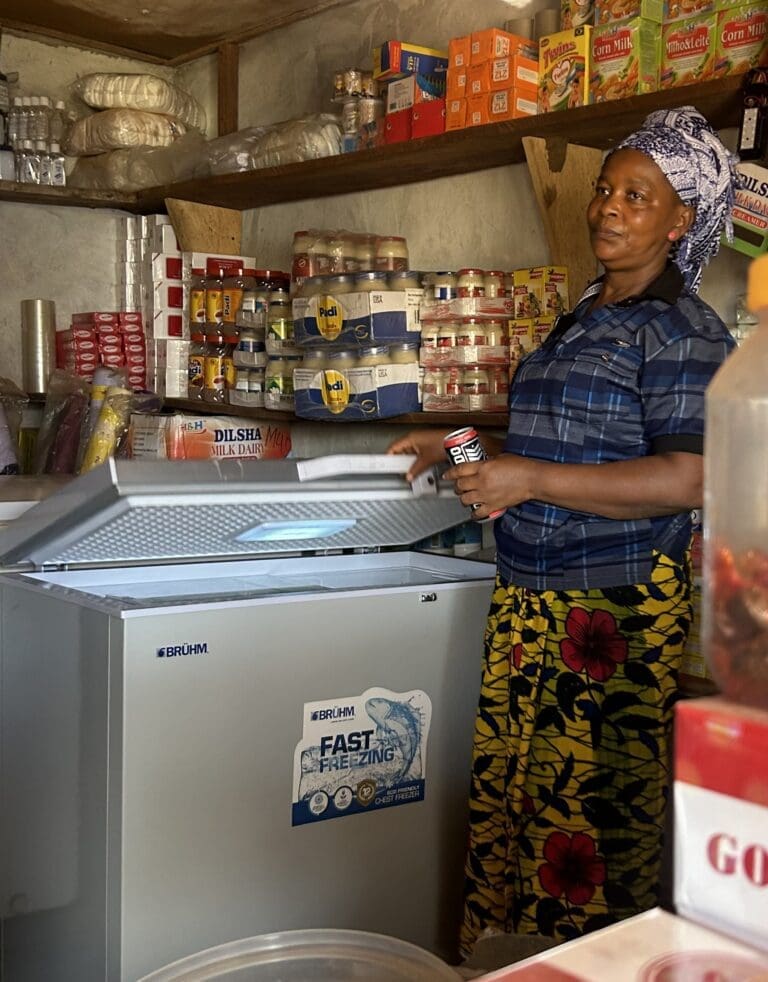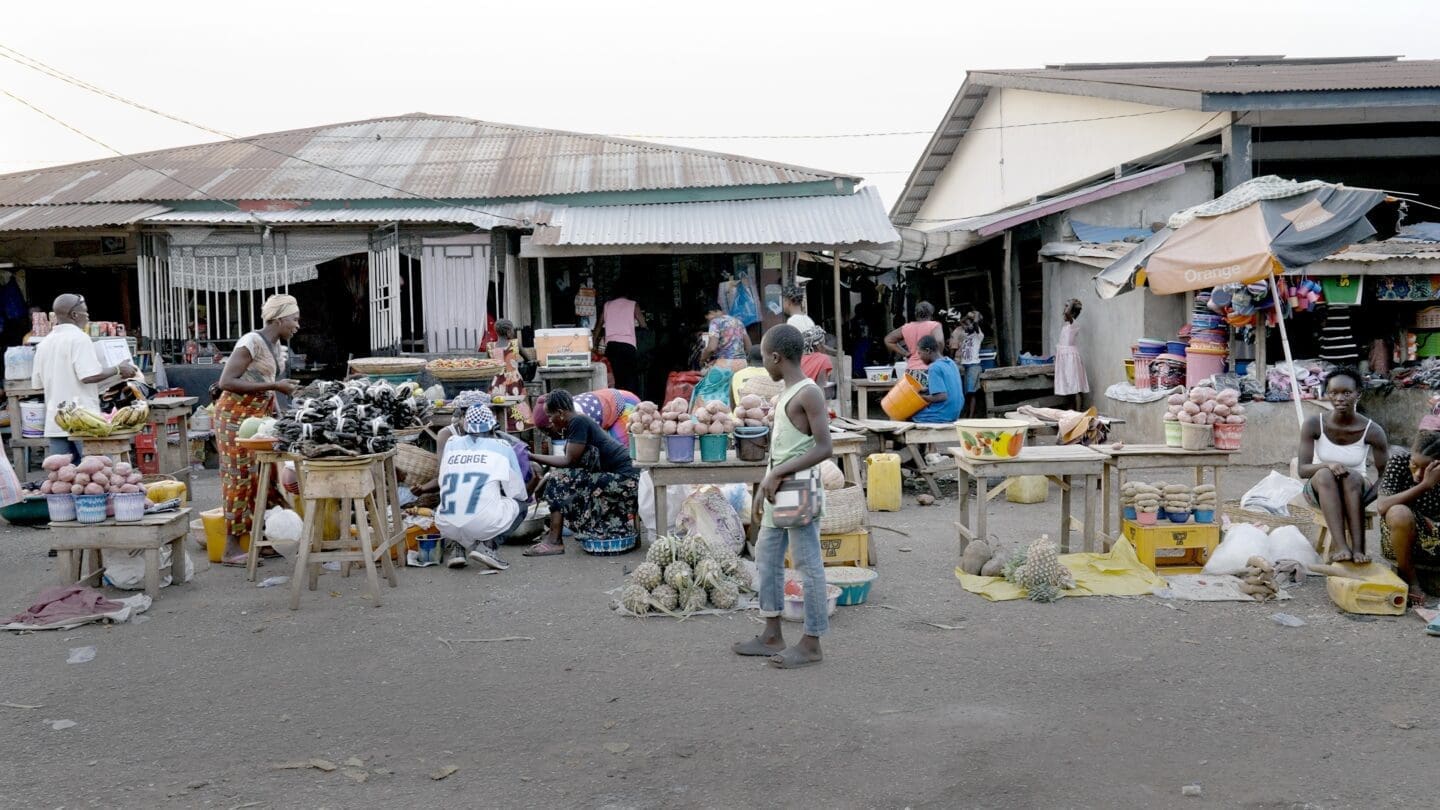- 8,000Women
- 99.4%
- 25%

Over time, the customers mostly returned. But Jalloh, who faced debt from the days that the Covid-19 pandemic shuttered the shop, still struggled to support her family.
Enter the Solar Harnessed Entrepreneurs (SHE) Project, aimed at developing and expanding profitable renewable energy-enabled businesses for women through financing, capacity building, and enhanced market access.
Jalloh received a solar-powered freezer, and now she sells not only medicines but cold drinks, which are popular in this hot, dry marketplace where roads intersect, travelers and truckdrivers merge for a rest stop, and the average annual temperature hovers above 80 degrees Fahrenheit (26.6 degrees Celsius.)
“It is helping change my life,” Jalloh said of the freezer.
Drink sales, she says, now bring in about 50,000 Leones, or about $2.50 per day, in a country where over half the population lives on less than $1.90 per day. It amounts to about a 10 percent increase in her daily income.
The $2.5 million pilot project, implemented by CARE Sierra Leone and supported by The Rockefeller Foundation and the Global Energy Alliance for People and Planet (GEAPP), targets nearly 8,000 women in nine of Sierra Leone’s 16 districts, with the aim of helping them expand their livelihoods through use of renewable energy resources.
GEAPP is committed to not only furthering an equitable green energy transition, but simultaneously meeting the challenges of energy poverty while supporting job and income creation.
Climate Change is Not Gender-Neutral
Women, who often bear disproportionate responsibility for gathering food, water, and fuel for their families, experience the greatest impacts of climate change, which amplifies existing gender inequalities and poses unique threats to their livelihoods, health, and safety, notes the United Nations Environment Programme and others.
“With the SHE project, we not only want to empower women as entrepreneurs, but we also want to improve their livelihoods,” said Sarah Maina-Kanda, Manager of Demand, Jobs and Livelihoods for GEAPP. “By creating sustainable and profitable renewable energy businesses, women can generate income, support their families, and contribute to their communities. We believe this will not only benefit women entrepreneurs, but also have a positive impact on the wider community and the environment.”
“This flagship project is a beautiful intersection between women’s empowerment and climate justice,” added Yaikah Jeng-Joof, Country Director for CARE Sierra Leone and Liberia. “We support these women as they grow their businesses, but in a climate-friendly way. Already at the halfway mark of this pilot project, we are seeing a lot of impact.”
“Our culture is quite patriarchal. The businesses women start are small income-generating activities,” Jeng-Joof said. “So the monies coming in are often not substantial enough to be meaningful. And a big challenge they face is having access to loans if they want to build their businesses. The collaterals banks ask for are not available to them.”
To shift this pattern, CARE partnered with microfinancing institutions to give businesswomen low-interest loans, and with Power Leone to provide them with solar-powered appliances such as freezers or cassava mills. The women receive training in financial literacy and business management, as well as enhanced market access to help their businesses grow.
CARE also engaged in “household dialogues” with male family members to explain how empowering women helps the family and the larger community. “We don’t want the men to feel alienated or there to be a backlash,” Jeng-Joof said.
The impact reaches well beyond these women entrepreneurs. Many of the women use the average 25 percent reported increase in their incomes to support their children’s educations.
New Kind of Support for Businesswomen
Sierra Leone, with a population of about 8.425 million on the Atlantic coast of West Africa, is dominated by poverty.
Some 59 percent of the population is multidimensionally poor, meaning they are deprived of income, education, and basic infrastructure services. Some 81 percent are either moderately or severely food insecure, according to the United Nations World Food Programme.
The country also has one of the world’s highest illiteracy rates, at 69.3 percent for males and 80 percent for females.
Low literacy rates cost the global economy some $983 billion annually in welfare, unemployment, and social programs as well as reduced government tax revenue and productivity, the World Literacy Foundation notes.
The United Nations Development Program’s Gender Inequality Index ranks Sierra Leone 181 out of 191 countries for gender equality, tracking indicators such as education, adolescent birth rates and maternal mortality rates.
As of 2021, only 12.3 percent of parliament seats were held by women.
However, in January 2023, the country’s president signed into law the Gender Equality and Women’s Empowerment Act, which enshrines improvements to women’s access to finance, employment opportunities, equal pay, maternity leave, and–critically–political representation.
CARE’s baseline study that it conducted at the start of the SHE Project showed that Sierra Leonian women running businesses tend to work informally on the margins and are poor in assets.
A full 99.4 percent of the targeted women entrepreneurs had never received any funding or business development support.
Some 71 percent of the women-owned businesses had poor record-keeping skills, and 79 percent expressed a lack of confidence in using electrical appliances to support their businesses.
Her Priority? Her Children's Education
Zainab Turay’s father Ibrahim instilled his daughter with a love of education. But when she was 10 years old, he was killed in the civil war.
She stopped attending school. In all, some 67 percent of school-age children were forced out of school during that war, which ran from 1991 to 2002 and left over 50,000 dead.
Now Turay runs a small general store at Moyamba Junction, selling everything from superglue to onions, rice, and cigarettes. Her husband drives a taxi.
Making ends meet can be difficult.
But with the solar-powered freezer from the SHE Project, she has added about 40,000 Leones, or $2, per day to her income, which she said has made a big difference.
“If my father were able to see me now, he would be happy and proud, because he wanted me to do something with my life,” she said.
She is working to ensure the education that her father had wanted for her will now go to her own six children, ranging in age between 9 and 21 years old. “The freezer,” she said, “is like a parent because of the benefits it provides.”


Elevating Women’s Voices in Their Communities
In Gbangbatoke, a small southern town, Marie Squire sits outside a shop with largely empty shelves—but it does boast a freezer from Project SHE.
A single mother of three ranging in age from 3 to 16, she sells wine and cold drinks. She credits the freezer with allowing her to support her family.
Nearby, Mariama Fortune, another freezer recipient and also a single mother, recalls how she launched her first business venture at age 15, selling fried cassava in the local market. She believes business is in her blood.
But that doesn’t mean she was able to get a bank loan when she started her own shop at the market in Gbangbatoke. The bank said no. A friend lent her 17 million Leones, or about $865, which allowed her to start her business.
Now her goals are to expand her shop to another location and provide an education for the five children she cares for—two of her own and three others whose parents are away or inattentive.
Day-to-day life is still difficult—she recalls, for instance, when she purchased eight bags of onions that turned out to be rotten.
“It was a big loss,” she said. “But the freezer has helped me a lot. I feel good that I can provide for myself and the children.”
Jenf-Joof dreams of expanding the pilot project. “We want these women to have return on investment in their businesses,” said Jeng-Joof. “That’s important and impactful. But the ultimate goal for me would be to see them become voices in their communities.”
